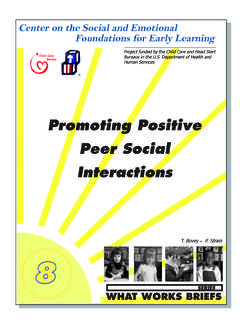Transcription of Peer Support: A Theoretical Perspective
1 1 peer support : A Theoretical Perspective Shery Mead, Mead Consulting 302 Bean Road Plainfield, NH 03781 David Hilton, Director, Office of Consumer Affairs New Hampshire Department of mental Health & Developmental Services 105 Pleasant Street Concord, NH 03301 Laurie Curtis, Consultation, Evaluation & Training for mental Health Services 83 Davy Road Middlesex, VT 05602 2 Authors Biographies Shery Mead, MSW and doctoral student at Fielding Institute, is the founder and past director of three New Hampshire peer support programs including a peer run hospital alternative.
2 She consults on the issues of recovery, trauma and mental health, systems change and the development and implementation of peer operated services. David W. Hilton, MA is the Director of the Office of Consumer Affairs for the New Hampshire Department of mental Health where he conceived, organized and implemented a statewide system of alternative services developed and operated by consumers. He has worked for fifteen years in leadership development in the mental health field. Laurie Curtis, MA, is an independent consultant and educator specializing in helping mental health services to develop and to enhance recovery-oriented policies, practices, and lifestyles.
3 She is an Associate Clinical Professor for the graduate Program in Community mental Health, Trinity College of Vermont. For further information contact Shery Mead at 302 Bean Road, Plainfield, NH 03781. PHONE: 603/469-3577. E-MAIL: 3 Abstract This article offers one Theoretical Perspective of peer support and attempts to define the elements that, when reinforced through education and training, provide a new cultural context for healing and recovery. Persons labeled with psychiatric disability have become victims of social and cultural ostracism and consequently have developed a sense of self that re-enforces the patient identity.
4 Enabling members of peer support to understand the nature and impact of these cultural forces leads individuals and peer communities toward a capacity for personal, relational and social change. It is our hope that consumers from all different types of programs ( drop-in, social clubs, advocacy, support , outreach, respite), traditional providers, and policy makers will find this article helpful in stimulating dialogue about the role of peer programs in the development of a recovery based system. 4 peer support : A Theoretical Perspective The consumer movement, in the mental health arena, seeks social justice through understanding mental illnesses in terms of human rights, the social suppression of difference, and the medicalization of difference by psychiatric diagnosis.
5 The consumer movement seeks personal liberation and wellness in the context of recovery based environments (Curtis, 2000). Through developing an understanding of oppression as a common theme among all of us with psychiatric labels, we discover the ways in which people have been marginalized by their culture, as opposed to seeing us simply as insane . Cultural Context The cultural mainstream defines and decides ranges of normal , seeking to have those of us with psychiatric labels blend into those ranges. People labeled with mental illness often fall outside the typical definition of normal and do not smoothly blend with the dominant culture.
6 We, as users of mental health services, often referred to as consumers , are forced to understand our problems as solely a biological matter. This denies the social and environmental factors that may have precipitated or contribute to the distress. Having been marginalized by this model we have adopted roles as mental patients. Some of us have accepted this role, while others have not. In general people with perceived difference internalize the dominant cultural perception. This is true of the mental patient role in society and is largely why we have a 5 mental health industry.
7 Yet, even in insanity , there are islands of clarity (Podvill, 1990). If we can pursue a broader discussion, if we can step outside of the box of the medical model, peers, ourselves, have revealed is that environments of health create healthy members and environments of illness create professional mental patients. Early on in the consumer movement, Zinman and Harp, in Reaching Across (1987), made clear how pervasive the impact of the medical model was on mental health policy, practice and research: our problems have been defined as diseases to be treated by professionals.
8 This process tends to deny that other contributing stressors ( abuse, poverty, loss, violence and trauma) are factors. Perpetrators are thereby overlooked; children are over-medicated; and society ignores the culturally sanctioned epidemic of violence. For example, White (1990) writes, these ways of speaking and interacting with people puts them on the other side of knowledge, on the outside. These ways of speaking and acting make it possible for mental health professionals to construct people as the objects of psychiatric knowledge, to contribute to a sense of identity which has otherness as it s central feature (p.)
9 14). Traditional research methodologies and hypotheses are founded on beliefs that we won t get over having a mental illness; we are only capable of functional healing as we attain certain socially prescribed goals housing, job security, social integration, and so forth. There is no dialogue about wellness or about how we might exist, even thrive, within a culture that values and evaluates based on our own personal goals. If researchers would let go of methodology and epistemology that defines mental illnesses as a permanent disability we could, through a dialectical evaluation of how people have recovered, explore the relationship of peer support and self-help to recovery.
10 In this we could establish a new 6 foundation for how we understand mental illness within the context of recovery. What peers know is that we can and do get well. We outgrow the role of mental patient. This discovery came from the arena of peer support and advocacy, however, hence the need to understand and document the Theoretical underpinnings of how this works in these environments. At the same time peer support programs are developing, they must participate in the design of research and evaluation processes that are drawn from the rich evolving nature of what we are learning.

